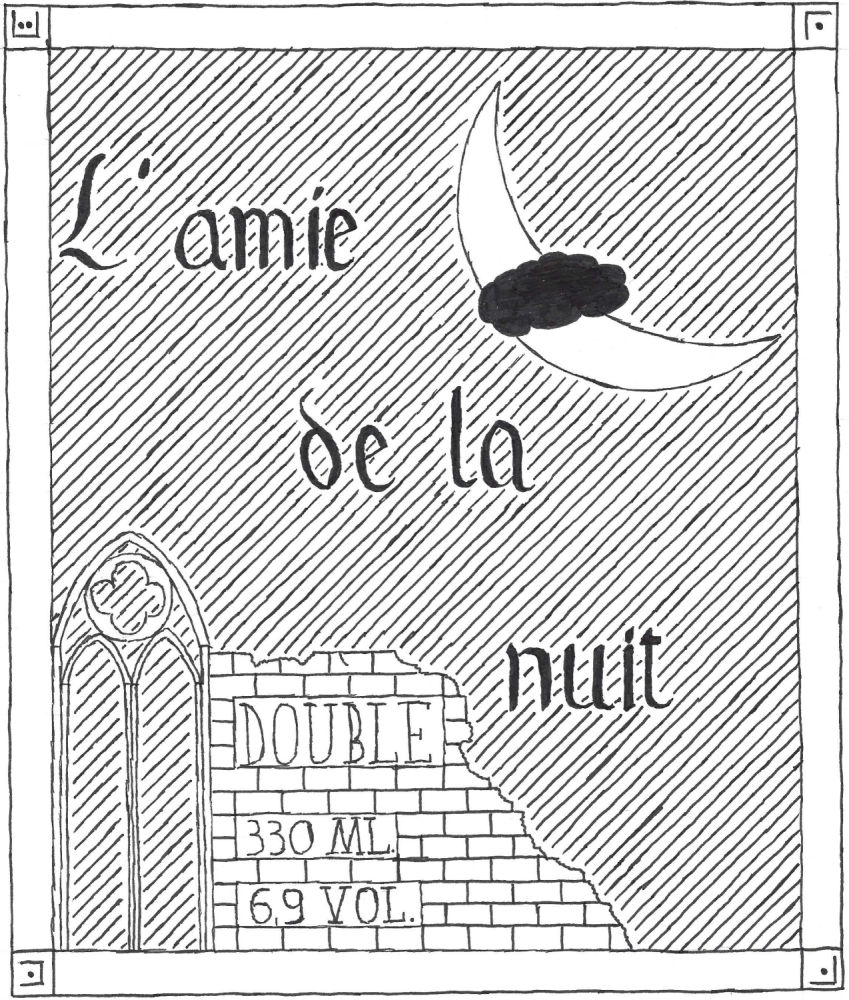
L'amie de la nuit is a Dubbel, a dark Belgian-style Abbey Ale. This style has a rich history that is deeply intertwined with that of the Belgian monasteries, especially those of the Trappist order. Abbey beers in general are part of a long tradition that reaches back into medieval times. Back then the monks used beer as nourishment during Lent. It should be noted that in medieval times beers did not have the low final gravity of today's beers and with that they were weaker in alcohol than modern Dubbels and Doppelbocks. Instead they were probably richer in protein and sugar and provided substantial sustainance. This is also way more logical than monks that drink beers with 8% ABV on an empty stomach during Lent. Some monasteries also brewed beer to finance themselves. Many Trappist breweries still do that today. The name "Dubbel" originates from that tradition. The Dutch-speaking monks back in the day brewed a weak table beer for consumption within the monastery which they called "Enkel" (Dutch for "Single") and a stronger beer with double the amount of malt that was sold to outsiders and called "Dubbel" (Dutch for "Double"). With such a rich tradition it is not surprising that Dubbels are rather traditional beers. They are dar and top-fermented as most of the beers prior to the 18th century must have been. They survived the triumph of pilsener and its pale Lager cousins in this form and adapted novelties in malting or brewing only if they increased the beer's quality without changing its character. One particularly important innovation sneaked into the style in the 20th century and is now an important part for every modern Dubbel: The use of adjunct sugars. With Belgium passing the Vandervelde law in 1919 which prohibited the sale of liquor in bars, the average ABV of Belgian beers rose. The monastic breweries adapted to this. There is some evidence that originally the breweries used the adjunct sugar to raise the ABV because there was a shortage of malt. Regardless of whether or not this is true, most modern Dubbels are brewed with some dark sugar for such a high ABV and some color. As a result, Dubbels are strong beers that feel surprisingly light for their ABV. Zealots of the German Reinheitsgebot get a little upset over this but this is a neat little trick and one of the signature ingredients of most Belgian Strong Ales.
L'amie de la nuit is brewed with all three ingredients that make Belgian Abbey Ales so special: Adjunct sugar, an expressive top-fermenting yeast and multiple months of maturation. As a rather malt-forward beer, it is best served in a chalice glass. An original trappist chalice would be authentic but a big red wine glass works equally well and the beer still tastes good when it is drank from a pint glass or a pilsener tulip. The optimal serving temperature ranges between 10 and 12°C, so take the beer out of the fridge 30 to 45 minutes before drinking. The beer pours hazy and reddish-brown with an off-white head. The aroma is dominated by yeasty esters and phenols with their banana and spice notes. Some dried fruit and caramel from the malt is also present. L'amie de la nuit is rather full-bodied and effervescent. The taste is similar to the aroma and dominated by yeasty spice and banana while the malts contribute flavors of raising and other dried fruits. A slight alcohol warmth is also present. The caramel malts and the high ABV make the beer seem sweet but the adjunct sugar and the low final gravity let it finish rather dry and spritzy. Don't let this fool you: The beer still has its Belgian Strong Ale punch.
Great food pairings for Dubbels include Game and chocolaty Desserts. They are not really beers for a party. With their complexity and their warming effect they are best enjoyed on cold and rainy days in the fall in a comfortable chair and accompanying a good book. Maybe a history novel about medieval monasteries.
L'amie de la nuit is made in a 25-liters kettle using the Brew-in-a-bag technique. For about 16 liters of beer you need the following ingredients:
The mash takes 90 minutes at 65°C using 20 liters of water. After mashing, two more liters of water are added. The boil takes 70 minutes and the hops are added as a bittering addition 60 minutes before flame out. The dry yeast is rehydrated and added to the wort. Primary fermentation takes two weeks at about 18°C. For the secondary fermentation, the beer is bottled and primed with sugar equivalent to 2.5 units of CO2. It is stored for three months at about 20°C.